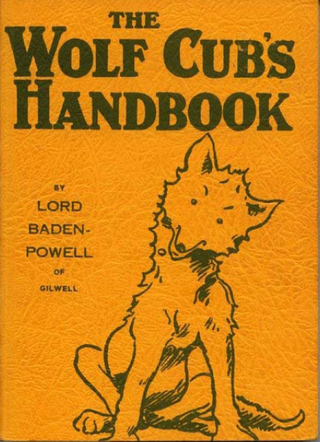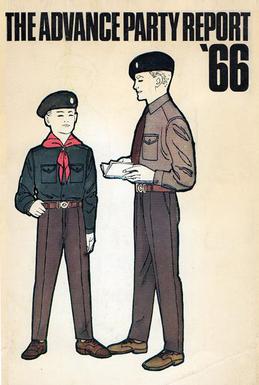
The Jungle Book is an 1894 collection of stories by the English author Rudyard Kipling. Most of the characters are animals such as Shere Khan the tiger and Baloo the bear, though a principal character is the boy or "man-cub" Mowgli, who is raised in the jungle by wolves. Most stories are set in a forest in India; one place mentioned repeatedly is "Seeonee" (Seoni), in the central state of Madhya Pradesh.

The two-finger salute is a salute given using only the middle and index fingers, while bending the other fingers at the second knuckle, and with the palm facing the signer. This salute is used by the Polish Armed Forces, other uniformed services in Poland, and, in some countries, the Cub Scouts.

Raksha is a fictional character featured in Rudyard Kipling's Mowgli stories, collected in The Jungle Book and The Second Jungle Book.

Cub Scouts, Cubs or Wolf Cubs are programmes associated with Scouting for young children usually between 8 and 12, depending on the organisation to which they belong. A participant in the programme is called a Cub. A group of Cubs is called a "Pack".

Cub Scouting is part of the Scouting program of Scouting America, formerly known as Boy Scouts of America (BSA), available to boys and girls from kindergarten through fifth grade, or 5 to 10 years of age and their families. Its membership is the largest of the five main BSA divisions. Cub Scouting is part of the worldwide Scouting movement and aims to promote character development, citizenship training, personal fitness, and leadership.

"Mowgli's Brothers" is a short story by Rudyard Kipling. Chronologically, it is the first story about Mowgli although it was written after "In the Rukh", in which Mowgli appears as an adult.

Scouts South Africa is the World Organization of the Scout Movement (WOSM) recognised Scout association in South Africa. Scouting began in the United Kingdom in 1907 through the efforts of Robert Baden-Powell and rapidly spread to South Africa, with the first Scout troops appearing in 1908. South Africa has contributed many traditions and symbols to World Scouting.

A Scout leader or Scouter generally refers to the trained adult leader of a Scout unit. The terms used vary from country to country, over time, and with the type of unit.

Cub Scouts is the Cub Scout section of Scouts Canada for children aged from 8 to 10. Originally the "Wolf Cubs," the program offers badges to youth members as a mark of achievement in an interest area. The badges are grouped into six activity areas as described in The Cub Book. While youth experience fun and excitement presented by the program, each activity area focuses on a specific purpose and goal, intended to be relevant to modern children while meeting developmental needs. Originally the requirement entry was age 7 until 2001. Each activity area offers a variety of badges that youth may earn and sew onto their uniform sash:
Beavers is a programme associated with some Scouting organisations generally for children aged 5/6 to 7/8 who are too young for the Cub programme.

The Wolf Cub's Handbook is an instructional handbook on Wolf Cubs training, published in various editions since December 1916. Early editions were written and illustrated by Robert Baden-Powell with later editions being extensively rewritten by others. The book has a theme based on Rudyard Kipling's The Jungle Book jungle setting and characters.

The Pathfinder & Rover Explorer Scouts' Association (P-RESA) is an independent Traditional Scouting Association in the United Kingdom, with International branches. The Association's training programme runs along the lines of Baden-Powell's original Scouting for Boys, upholding the traditions and practices set out by B-P, using the 1938 Boy Scouts' Association Policy Organisation & Rules (POR) as its basis.
Cub Scouts is the section of Scouts Australia for boys and girls aged 8 to 11 (inclusive), often known simply as 'Cubs'. The Cub Scout section follows after Joey Scouts and is before Scouts. Cub Scouts wear a uniform shirt with navy blue panels, and yellow shoulders.

Cub Scouts, often shortened to Cubs, are a section of Scouting operated by The Scout Association with a core age of eight to ten and a half years of age. This section follows on from the Beaver Scouts and precedes the Scout section.

Akela is a fictional character in Rudyard Kipling's stories, The Jungle Book (1894) and The Second Jungle Book (1895). He is the leader of the Seeonee pack of Indian wolves and presides over the pack's council meetings. It is at such a meeting that the pack adopts the lost child Mowgli and Akela becomes one of Mowgli's mentors.
Wolf Cubs, usually referred to as Cubs, is the 3rd youngest section of Scouting operated by the Baden-Powell Scouts' Association, following on from the Beaver Scouts section. The core age range for Wolf Cubs is eight to eleven, though exceptions can be granted. Individual sections of Wolf Cubs, known as a Pack, are run by the local Scout Group. After reaching the age of ten and a half, a Wolf Cub may move on to Scouts.

The Boy Scouts Association's The Chief Scout's Advance Party Report 1966 attempted to address the association's falling enrollment numbers and modernise its programs. It resulted in changes to traditional iconic uniforms, changes to awards, training schemes, the association's name and other nomenclature, reduced distinctions between Cubs and Scouts and discontinuation of Rovers. However, the changes failed to halt decline in older enrolments, resulting in a shift to younger ages and also resulted in disaffection, a schism in the organisation, growth of the alternate British Boy Scouts and European Scout Federation, formation of independent Scout groups and further alternate Scout organisations, particularly the Traditional Scouting Baden-Powell Scouts' Association and helped to re-establish understanding of Scouts as a movement rather than a single organisation.

The Grand Howl is a ceremony used by Cub Scouts and Brownies. It was devised by Robert Baden-Powell, the author of the scouting guide Scouting for Boys, and is based on the Mowgli stories in Rudyard Kipling's Jungle Book. In the ceremony, Cubs act out the wolves greeting Akela, the "Old Wolf", at the Council Rock and are reminded of the Cub Scout Promise. Baden-Powell also created a Grand Howl for Brownie Guides, which was in imitation of an owl instead of a wolf. It has been used as an opening and closing ceremony as well as a method of conveying thanks or appreciation by all sections of Scouting.
Vera Charlesworth Barclay (1893–1989) co-founder of Cubs 1916, was an English pioneer of Scouting and an author. She was an early exponent of female leadership in the Scout movement and played a leading role in the introduction of the Wolf Cub programme for younger boys, both in the United Kingdom and in France. Barclay wrote numerous children's stories and instructional Scouting handbooks, and in later life wrote about her Christian faith.














